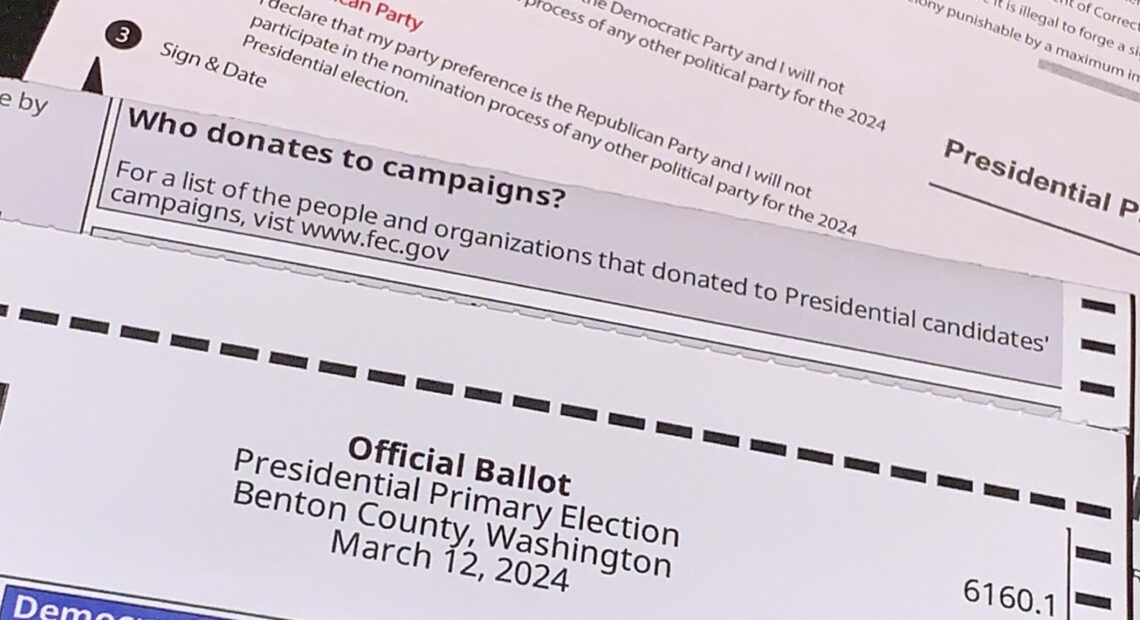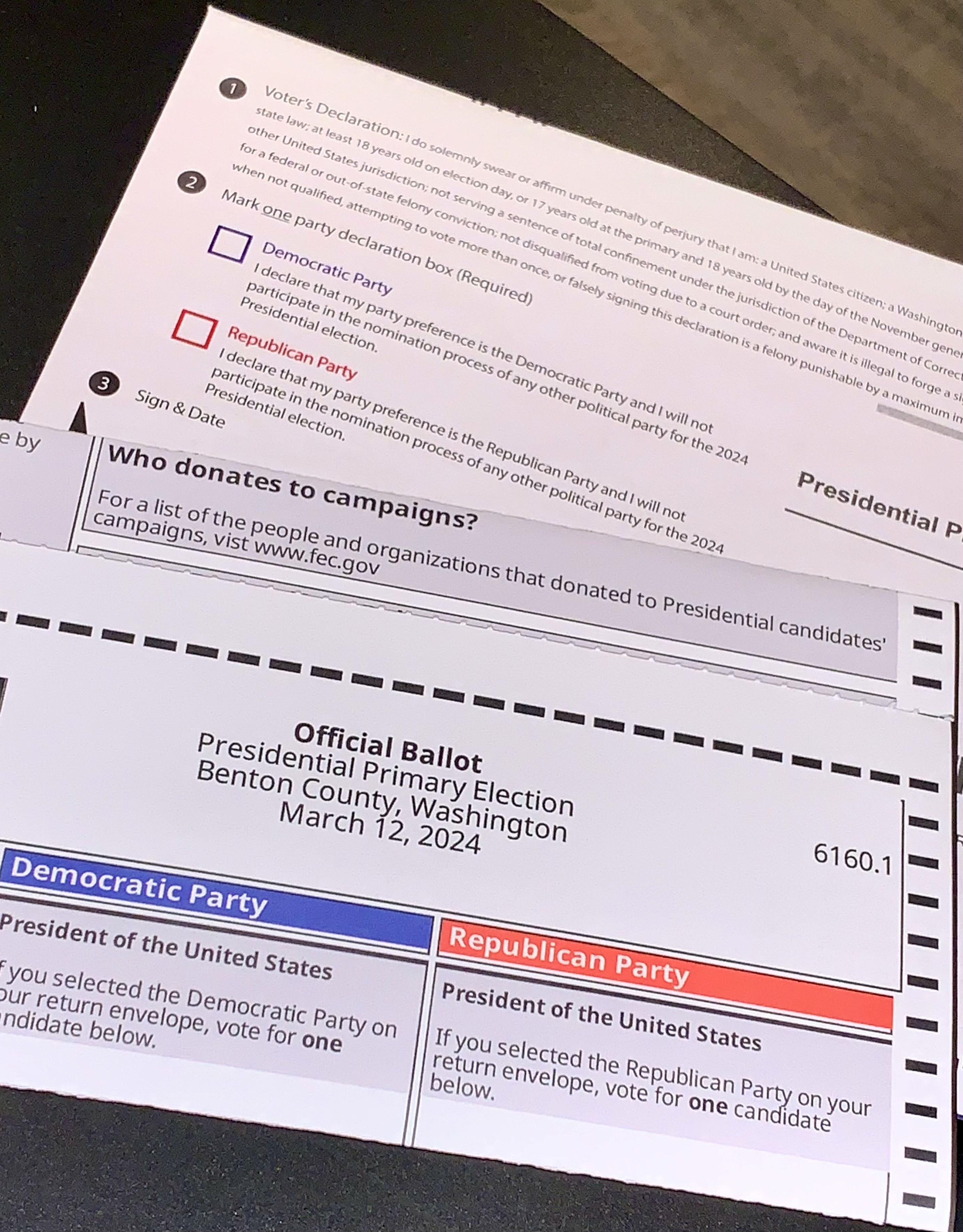
NWPB elections survey: Your questions answered
Listen
(Runtime 7:53)
Read
In preparation for the general election this November, Northwest Public Broadcasting’s newsroom is answering your questions about elections. Hundreds of people took an NWPB survey.
Morning Edition host Connor Henricksen interviewed westside regional reporter Lauren Gallup to answer some common questions people had.
Connor Henricksen: “Well, Lauren, thanks for joining me to talk about this election survey. What was it? And how does this kind of survey improve the election reporting process?”
Lauren Gallup: “Yeah, for sure. Thanks so much for having me. First of all, it’s our mission here at NWPB just to listen and report on the things that really matter to our communities. So we created this survey as a tool this year just to gather information from our audience members, and find out what really matters to them. We got a lot of really good responses, almost 300. That’s going to inform our reporting this year, it already has. I’ve reported on some questions about election integrity with our mail-in voting system. We answered a question about ballot rejection rates in Mason County. So the idea is really to find out what you all as our audience want to know, and better understand heading into this year’s election.”
Henricksen: “I’ve got a couple of questions from people who wrote into the survey as well here. And I’d like you to dig into these ones a little bit. We heard from Mitch, who was wondering where they can find information about who won local races in their county?”
Gallup: “Yeah, yeah, that’s a good question. And I love this question, because it’s really important to us as reporters, right? Like, we’re watching the election results, election night, and in the days afterward. So it totally goes in with our line of work. After the election, you know, votes have come in, they’re processed by election workers. And then the counties are going to release election results. A lot of times, they’ll do that in batches. So they’ll say, you know, here’s preliminary results, we’ve got 30% of ballots counted, you know, it’s looking like this candidate is pulling ahead. But that’s going to take some time, sometimes it’s a period of weeks, right, they’ll continue to release results as they’re just checking all those ballots. It’s a long process. And there’s people and machines doing the hard work to do it. The secretary of state also compiles all the information, so you can look at both their website, also your county website. You can also follow your favorite news organizations, [which] often report on those. And then for this year’s general election, those results are certified 21 days after the election, I believe. So it’s a full three weeks. So again, it takes a lot of time.”
Henricksen: “All right. We also heard from Colin, who’s wondering what an open primary is, and then Mark tagged along with that, why do we have to declare a party in Washington in order to participate in primaries?”
Gallup: “Yeah, so I’ll answer the open primary question first. So an open primary, which happens in a number of states, but not in Washington, is where voters can cast a ballot for the candidate of their choosing, regardless of the party affiliation of the candidate and the voter. But that’s not exactly what we have in Washington. A handful of states do this single primary, and then it’s called a top two primary. So for Washington primaries, you can vote for a candidate of your choosing, and then the top two will go on in advance to the general, but then our presidential is even a little bit more different. And that gets to Mark’s question of having to claim a party. So you only have to claim party affiliation as a voter in a presidential primary in Washington. It’s an internal party process. It’s approved by the U.S. Supreme Court, as you know, being okay to do for parties to ask that of voters. So you might remember if you voted in this March primary, you had to indicate a candidate on your ballot and you had all the options, right? So it’s that single primary, but then when you turned your ballot in, you had to also indicate what party you aligned with, and that had to align with your candidate. And I know a lot of people were confused by that. Do they have to do it to count? Yes, you do have to do that for your vote to count in the Washington presidential primary.”
Henricksen: “And going back to the top two thing, is that why we sometimes see two Democrats on our ballots?”
Gallup: Yes, the exact idea is to have, you know, just the top two candidates that voters are interested in advance regardless of party. So sometimes you might have two Democrats or two Republicans.
Henricksen: “Teresa is wondering who this is going to be a long, long process for a bill to become law.”
Gallup: “Okay, this is a long one, right. And I think we all remember the awesome ‘Schoolhouse Rock’ song. So I definitely direct people to that for some fun and easy listening. But I’ll explain this in brief for the Washington State Legislature. So our representatives are going to introduce bills into the legislative session that’s read on whatever floor they belong to. And then it goes through multiple steps. It goes through committees, committees do multiple hearings, including public hearings where folks can comment on issues within this proposed bill. Then if it moves forward, it’s going to go on to rules making. A select number of those are going to move ahead to second and third reading. Every time there’s possibly things that are being changed about the bill. Lawmakers are getting to weigh in from what their constituents want out of this legislation. And then if it passes in the first house, it moves on to the second, goes through those exact same steps again. And then a number of people are going to sign off on that bill before it goes to the governor’s desk. And then the governor will either sign the legislation or they can still veto it at that point. So there’s a lot of people that have their hands on legislation before it actually becomes law, and are changing it over the entire session.”
Henricksen: And it sounds like there’s a lot of options for public input.
Gallup: “Yeah. And it’s exciting, right, because the public can participate. They can provide comment, they can ask questions. We watch a lot of this as reporters during the legislative session, and I’m just always impressed by the number of people.”
Henricksen: “We heard from Sandra, who’s wondering what voter turnout typically looks like here. And what can be done to improve voter turnout.”
Gallup: “I took these questions to our secretary of state’s office, because they have really good statistics about voter turnout. And of course, it’s different depending on what county you’re in and what election. Voter turnout is typically lower for primary elections and for special elections. Then it increases for general elections. So we’ll look at some recent results, just to kind of compare. The March primary had between like 35% and 45% of turnout for most counties which, you know, is okay. It’s not the majority of people, right, but I think that’s what counties typically see. But then people get really excited about general elections. So looking back in 2022, which had really great voter turnout, all counties had 50% or higher, many were in the 60% to 70% range. So that just shows that when we talk about who’s running for office, or there’s important issues on the ballot that people are aware of, I think a lot of folks turn out. You know, the secretary of state’s office, and then counties across the state have done a lot of outreach efforts, particularly in the past couple election cycles just to talk about ballot security, and more transparency around the process, which we’re trying to do as reporters too. Just so folks understand what happens when they vote and that they, you know, feel comfortable with the process.”
Henricksen: “All right. So we also heard from one respondent with a bit more of a direct, somewhat combative question where they used an expletive. But the heart of it was; why do so many jerks run for office?”
Gallup: “Yeah, that was one, you know, one person, but I will say, looking through the responses and questions that folks had, you know, there was a lot of similar remarks expressed and I think maybe some general concern, right for who’s running for office, or just also maybe a lack of trust in the system? I can’t answer that as a fact-based question. That was a response that we got, and it was reflected in other responses, too. So maybe that says something.”
Henricksen: “Maybe a sign of our divisive political times. Well, Lauren, thanks for your time.”
Gallup: “Yeah, thanks so much. Appreciate it.”
_________
Find more NWPB election coverage here. There, you’ll also find our elections coverage mission statement.
Still have questions about elections, or other topics? You can always reach us at news@nwpb.org.
















